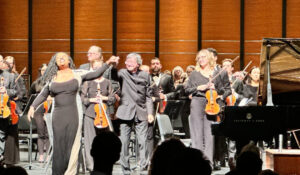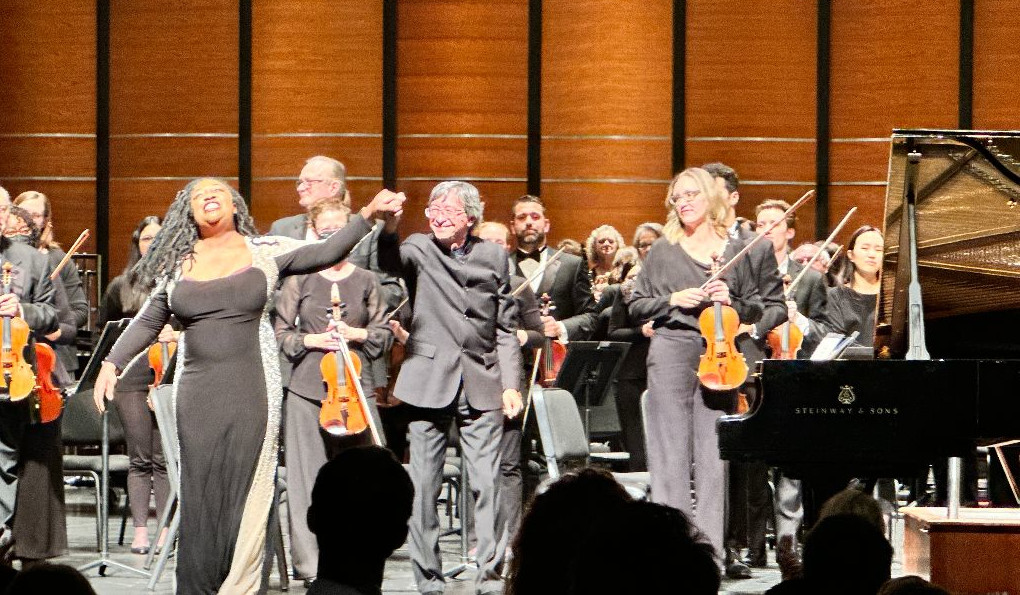Michelle Cann was front and centre at the Austin Symphony this weekend. Fresh off two major awards in 2022 (the Sphinx medal of excellence, and the Andrew Wolf Chamber Music award), Cann is now regarded as one of America’s foremost pianists. She currently serves on the faculty of the Curtis Institute of Music, but she graced the Long Centre stage to perform one of the most admired concertos of the late 19th century.
It is by Rachmaninoff: the Piano Concerto No. 2 in C Minor, Op. 18. The concerto was incorporated in the 1945 Hollywood film Brief Encounter.
The first movement opens like rolling thunder fully expressed by Cann; it morphs into a dreamy passage taken up by the larger strings and then the violins. The first theme that results has been likened to the tolling of low-pitched bells typically found in Russian churches. The second, romantic theme is a slow and tender passage that suddenly sprints to a dramatic conclusion.
In the second movement horns are quite evident as Cann poured her efforts into weaving a tale of desire. Once she struck a rapid series of notes in the highest register (a sparkling cadenza), the piano was signalling a surprise reset as the third movement was just getting into its stride. It gently entreated the orchestra to join it in a reconciliation shorn of acrimony. The orchestra launches into a celebration eagerly anticipated by the piano, which is bursting to tell the tale to all and sundry. This heralds one of the most recognizable passages in the classical music canon: an exuberant display of technical artistry for Cann to let loose and conclude the Concerto. Cann’s bravado on the piano was of such intensity one half expected the keyboard would combust.
Her expression of the Concerto was beyond any performance I’ve seen of that piece. She brought a certain rhythmic element to it, especially evident in the background lower register in the second and third movements. The duelling between the piano and orchestra was quite pronounced: they were competing intense, but equal, partners. Cann offered a dazzling encore, imbuing a Rachmaninoff Prelude in C sharp minor with a ragtime/jazz improv. A second standing ovation was well deserved.
Also on the program was the marvellous Egmont Overture by Beethoven, which some in the audience welcomed as a delightful alternative to the usual Beethoven symphonies that orchestras usually perform. Maestro Peter Bay had some major input into the String Quartet in C Minor by Franz Schubert. This work, best known as the Quartettsatz, is one his favourite chamber music pieces which dates to 1820. To this performance he added a part for the double bass, and modified the original violin parts. The result was quite successful, and is one more reason to celebrate his 25th year as Artistic Director of the Austin Symphony.
Concluding the evening was an unusual marriage of the spoken word (by opera singer Donnie Ray Albert) and music (by Joseph Schwantner). I found the music accompanying the words of MLK to be overly loud and not well connected to the dialogue. The work, from 1982, is entitled New Morning for the World: Daybreak of Freedom.
Overall an offering from both the 19th and 20th centuries that was sufficiently broad to appeal to everyone in attendance. The next masterpiece concert will feature only one composition: Song of the Night by Mahler. Go to www.AustinSymphony.org for tickets to the performances on Mar 24 and 25.
A special event is coming up on March 30:
Join us at Porsche Austin for a spectacular evening announcing our 2023-24 Austin Symphony Orchestra Season!
Thursday, March 30, 2023 | 6:00 pm
9800 Research Blvd, Austin
This elegant event includes multiple musical performances, a lavish dinner, a lively cocktail hour, and extraordinary live auction items. We want to celebrate our wonderful musicians with you and ensure that our Maestro’s Dream Initiative continues to flourish.
Proceeds related to this event prior to March 30th will go towards ASO’s core programming and education programs.
During the event, guests have the opportunity to support the Peter Bay Artistic Fund which is restricted to new and diverse programming such as our Chamber Orchestra Series “About Town.” Tickets start at $500.

